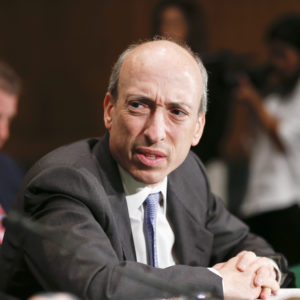The Securities and Exchange Commission this month threw a one-two punch at the cryptocurrency industry, hitting two major crypto exchanges with lawsuits alleging business practices that are putting consumers at significant risk.
The problem? As one expert claims, the suits could actually result in “fewer investor protections” depending on their outcomes.
The SEC announced on its website the lawsuits against crypto exchanges Coinbase and Binance, the former for having allegedly operated several financial services “without having registered any of those functions with the Commission,” and the latter in part for “commingl[ing] customer assets or divert[ing] customer assets as they please.”
Cryptocurrency exchanges are marketplaces where users can exchange digital currencies for other assets. SEC Chair Gary Gensler said in a speech this month that regulators “shouldn’t undermine 90 years of securities laws” in neglecting to police the crypto industry.
“There is nothing about the crypto securities markets that suggests that investors and issuers are less deserving of the protections of our securities laws,” Gensler said.
Meanwhile, experts say the lawsuits could signal a new era of more tightly regulated crypto markets or, counterintuitively, less regulatory oversight of the billion-dollar industries.
“The SEC is staking out a strong position that crypto is a security, not a commodity,” said Bill Maurer, the director of the Institute for Money, Technology, and Financial Inclusion at the University of California, Irvine.
“This is because, at the end of the day, most of them, for all the talk of decentralization or disintermediation, are actually quite centralized under the control of whatever entity issued them, and people are purchasing them linked to their evaluation of that entity’s potential profitability,” he said.
“This makes them more like a security in that people are purchasing them with the expectation of a return linked to the fortunes of that issuing entity.”
Maurer said the SEC may not be successful in its legal bids. If the commission fails, he said, then “another regulator would step into the fray,” such as the Commodity Futures Trading Commission.
“So, regardless of their outcome, I think the SEC lawsuits mark the beginning of a new, less wild-west chapter for crypto,” he said.
Josh White, a professor of finance at Vanderbilt University, said it was also possible that the lawsuits could backfire on the commission.
“There’s nothing that happens in D.C. by coincidence,” White said, pointing out that the lawsuits came just days after several representatives, including N.C. Rep. Patrick McHenry put forth a discussion draft for legislation to develop “a statutory framework for digital asset regulation.”
White said the two lawsuits are notably different in the severity of their allegations.
“For Coinbase, it was more like they were operating an unregistered exchange,” he said. “The Binance allegations sound to me more like FTX.”
FTX was the combination crypto exchange/hedge fund that collapsed last year after a panic surrounding the company’s solvency and capital leverage. The company’s founder and CEO, Sam Bankman-Fried, has since been hit with multiple federal charges, including fraud and money laundering, and is facing over a century in prison.
White said the Coinbase lawsuit could still pose an “existential risk” to the exchange, leading it to potentially move its operations overseas—a decision that could result in the opposite of what the SEC intended in the first place.
“[The suit] could potentially push them outside the SEC’s jurisdiction, so there could be fewer investor protections depending on where these entities operate,” he said.
Gensler has a long career in federal financial oversight, having served as Assistant Secretary of the Treasury for Financial Markets and Under Secretary of the Treasury for Domestic Finance, both under Bill Clinton. He was also Barack Obama’s chairman of the Commodity Futures Trading Commission.
In his speech earlier this month, Gensler argued, “markets ultimately are about trust,” and for 90 years, “that trust has relied upon compliance with the securities laws.”
“The crypto securities markets should not be allowed to undermine the well-earned trust the public has in the capital markets,” he said. “The crypto markets should not be allowed to harm investors.”
White said the outcome of the regulatory dispute would likely be decided more by politics than by litigation.
“If Republicans were to take the Senate and the White House, I think some version of the McHenry bill passes, and it forces the SEC to carve out exemptions,” he said.
“I actually think these lawsuits will outlast Gensler,” he said. “I think the next election cycle will determine the direction of crypto in the U.S.”


